would rather 的用法
would-rather的详细用法
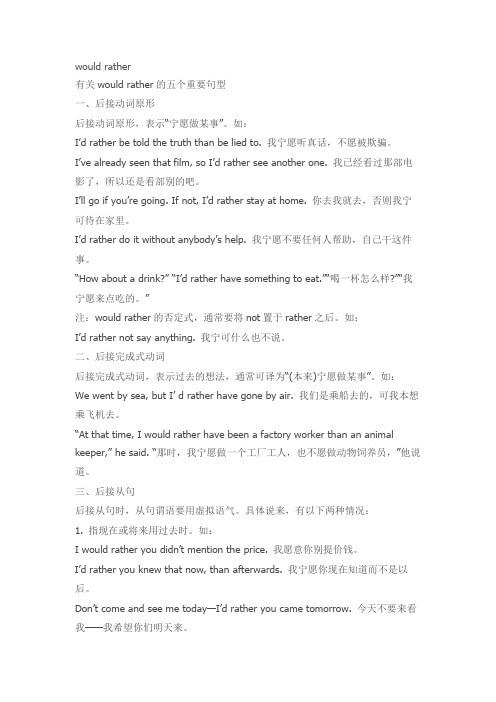
would rather有关would rather的五个重要句型一、后接动词原形后接动词原形,表示“宁愿做某事”。
如:I’d rather be told the truth than be lied to. 我宁愿听真话,不愿被欺骗。
I’ve already seen that film, so I’d rather see another one. 我已经看过那部电影了,所以还是看部别的吧。
I’ll go if you’re going. If not, I’d rather stay at home. 你去我就去,否则我宁可待在家里。
I’d rather do it without anybody’s help. 我宁愿不要任何人帮助,自己干这件事。
“How about a drink?” “I’d rather have something to eat.”“喝一杯怎么样?”“我宁愿来点吃的。
”注:would rather的否定式,通常要将not置于rather之后。
如:I’d rather not say anything. 我宁可什么也不说。
二、后接完成式动词后接完成式动词,表示过去的想法,通常可译为“(本来)宁愿做某事”。
如:We went by sea, but I’ d rather have gone by air. 我们是乘船去的,可我本想乘飞机去。
“At that time, I would rather have been a factory worker than an animal keeper,” he said. “那时,我宁愿做一个工厂工人,也不愿做动物饲养员,”他说道。
三、后接从句后接从句时,从句谓语要用虚拟语气。
具体说来,有以下两种情况:1.指现在或将来用过去时。
如:I would rather you didn’t mention the price. 我愿意你别提价钱。
高中英语---would rather用法总结
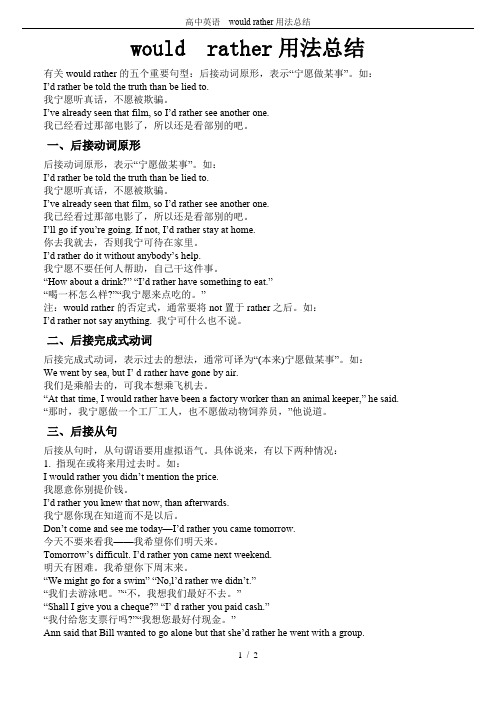
would rather用法总结有关would rather的五个重要句型:后接动词原形,表示“宁愿做某事”。
如:I’d rather be told the truth than be lied to.我宁愿听真话,不愿被欺骗。
I’ve already seen that film, so I’d rather see another one.我已经看过那部电影了,所以还是看部别的吧。
一、后接动词原形后接动词原形,表示“宁愿做某事”。
如:I’d rather be told the truth than be lied to.我宁愿听真话,不愿被欺骗。
I’ve already seen that film, so I’d rather see another one.我已经看过那部电影了,所以还是看部别的吧。
I’ll go if you’re going. If not, I’d rather stay at home.你去我就去,否则我宁可待在家里。
I’d rather do it without anybody’s help.我宁愿不要任何人帮助,自己干这件事。
“How about a drink?” “I’d rather have something to eat.”“喝一杯怎么样?”“我宁愿来点吃的。
”注:would rather的否定式,通常要将not置于rather之后。
如:I’d rather not say anything. 我宁可什么也不说。
二、后接完成式动词后接完成式动词,表示过去的想法,通常可译为“(本来)宁愿做某事”。
如:We went by sea, but I’ d rather have gone by air.我们是乘船去的,可我本想乘飞机去。
“At that time, I would rather have been a factory worker than an animal keeper,” he said. “那时,我宁愿做一个工厂工人,也不愿做动物饲养员,”他说道。
would rather
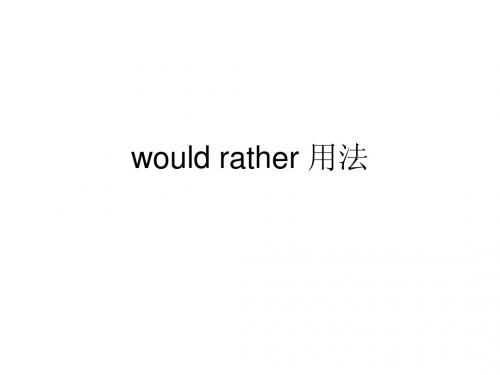
• 希望某人现在/ 将会做某事, 暗含事实上是不可能的 • 如: • I would rather you were here now . • 我希望你现在在这里就好了. • I would rather you saw me off at the airport tomorrow . • 我但愿你明天来机场送我. see off
• 2.would rather have done sth. 当时宁愿做 了...,暗含对过去作过事情后悔了 • 如:I would rather have taken his advice at the meeting • 我宁愿当时在会上听取他的建议就好了。 • (事实上我并没有那么听取,暗含我现在后悔 了)
would rather 用法
• 1.would rather do A than do B= prefer to do A rather than do B • 表示宁愿去做A,而不愿去做B • 如: • I would rather fail than cheat in the examination. • 我宁愿考不及格,也不愿意考试作弊。
• 4.would rather sb. had done sth. 宁愿某人 做过某事, 表示与过去事实相反 • 如:I would rather he had told me about it. • 我宁愿你过去跟我说的是实话. • 暗含而事实上你并没有跟我说实话.
•
worth 的 用法
• 1. worth: be worth + n. 当名词为金钱时, 表示"…… 值得……" • be worth doing sth. "……某事值得被做" • The question is not worth discussing again and again. • This second-hand car is worth $2000 at the most. • The exhibition is worth a visit/visiting.
(完整版)would-rather的五个重要句型
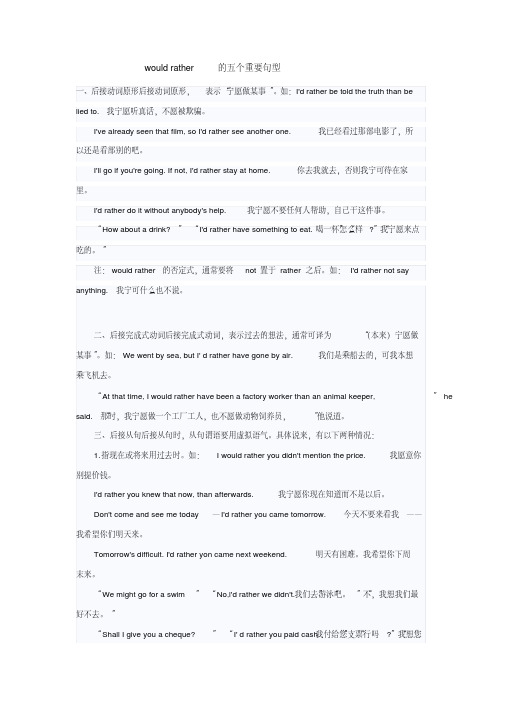
的五个重要句型
一、后接动词原形后接动词原形, 表示 “宁愿做某事 ”。如:I'd rather be told the truth than be
lied to. 我宁愿听真话,不愿被欺骗。
I've already seen that film, so I'd rather see another one.
l ’ d rather he had told / hadn
’ t told me a我bou(t 宁it ) 愿他告诉了 / 未告诉我这件事。
Katie went by car and I
’ d rather she hadn凯蒂’是坐t. 汽车去的,我宁愿地不坐汽车去。
二、后接完成式动词后接完成式动词,表示过去的想法,通常可译为
“(本来)宁愿做
某事 ”。如: We went by sea, but I' d rather have gone by air.
我们是乘船去的,可我本想
乘飞机去。
“At that time, I would rather have been a factory worker than an animal keeper,
“How about a drink? ” “I'd rather have something to eat. 喝一杯”怎“么样 ?”我“宁愿来点
吃的。 ”
注: would rather 的否定式,通常要将 not 置于 rather 之后。如: I'd rather not say
anything. 我宁可什么也不说。
末来。
“We might go for a swim ” “No,l'd rather we didn't.我们去游”泳“吧。 ”不“,我想我们最
would-rather的五个重要句型

would rather的五个重要句型一、后接动词原形后接动词原形,表示“宁愿做某事”。
如:I'd rather be told the truth than be lied to. 我宁愿听真话,不愿被欺骗。
I've already seen that film, so I'd rather see another one. 我已经看过那部电影了,所以还是看部别的吧。
I'll go if you're going. If not, I'd rather stay at home. 你去我就去,否则我宁可待在家里。
I'd rather do it without anybody's help. 我宁愿不要任何人帮助,自己干这件事。
“How about a drink?” “I'd rather have something to eat.”“喝一杯怎么样?”“我宁愿来点吃的。
” 注:would rather的否定式,通常要将not置于rather之后。
如:I'd rather not say anything. 我宁可什么也不说。
二、后接完成式动词后接完成式动词,表示过去的想法,通常可译为“(本来)宁愿做某事”。
如:We went by sea, but I' d rather have gone by air. 我们是乘船去的,可我本想乘飞机去。
“At that time, I would rather have been a factory worker than an animal keeper,” he said. “那时,我宁愿做一个工厂工人,也不愿做动物饲养员,”他说道。
三、后接从句后接从句时,从句谓语要用虚拟语气。
具体说来,有以下两种情况: 1.指现在或将来用过去时。
如:I would rather you didn't mention the price. 我愿意你别提价钱。
英语基础知识积累-would rather的用法
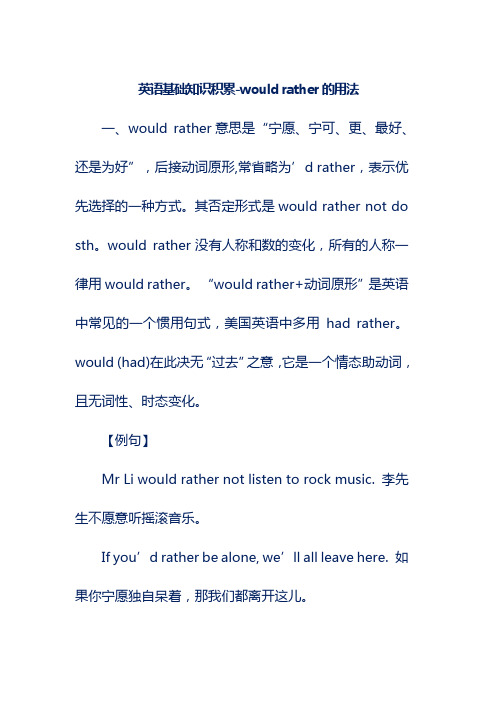
英语基础知识积累-would rather的用法一、would rather意思是“宁愿、宁可、更、最好、还是为好”,后接动词原形,常省略为’d rather,表示优先选择的一种方式。
其否定形式是would rather not do sth。
would rather没有人称和数的变化,所有的人称一律用would rather。
“would rather+动词原形”是英语中常见的一个惯用句式,美国英语中多用had rather。
would (had)在此决无“过去”之意,它是一个情态助动词,且无词性、时态变化。
【例句】Mr Li would rather not listen to rock music. 李先生不愿意听摇滚音乐。
If you’d rather be alone, we’ll all leave here. 如果你宁愿独自呆着,那我们都离开这儿。
He’d rather work in the countryside. 她宁可到农村去工作。
You would rather stay at home and do some reading this evening. 今晚你最好呆在家中读点书。
二、如果在两者中进行取舍,表示“宁愿……而不愿……,与其……宁可……”的意思时,则可用would rather…than…或would…rather than…的句型。
【例句】I would rather watch TV at home than go to the cinema. 我宁可在家看电视而不愿去看电影。
The children would walk there rather than take a bus. 孩子们宁愿步行去那里而不愿乘公共汽车。
请注意:1) would rather…than…/would…rather than…也可以颠倒为:rather than…would…。
英语重点词汇would rather句型详解
英语重点词汇would rather句型详解一、would rather不接从句用法(1)would rather do sth than do sth 宁愿做……而不愿做……(非虚拟语气)例:Liu Hulan would rather die than surrender before the enemy. 刘胡兰在敌人面前宁死不屈。
《汉英大词典》Kids would rather play than study孩子们宁愿玩也不愿学习。
《柯林斯高阶英汉双解学习词典》He would rather shoot himself than compromise his principles. 他宁愿一枪打死自己也不愿违背自己的原则。
《柯林斯高阶英汉双解学习词典》He himself believed in freedom, so much so that he would rather die than livewithout it.他非常崇尚自由,不自由,毋宁死。
《柯林斯高阶英汉双解学习词典》Most men would rather go to the grave than own up to feelings of dependency.大多数男人宁死都不愿承认有依赖感。
《柯林斯高阶英汉双解学习词典》She would rather perjure herself than admit to her sins.她宁愿在法庭上撒谎也不愿承认她的罪行。
《柯林斯高阶英汉双解学习词典》They would rather take the line of least resistance than become involved inarguments.他们倾向采用阻力最小的方案,不愿卷入纷争。
《柯林斯高阶英汉双解学习词典》I would rather pay for a meal than watch nine friends pick over and split a bill我宁可掏钱请客,也不愿看到9位朋友算来算去分摊账单。
wouldrather的详细用法
would rather有关would rather的五个重要句型一、后接动词原形后接动词原形,表示“宁愿做某事”。
如:I’d rather be told the truth than be lied to. 我宁愿听真话,不愿被欺骗。
I’ve already seen that film, so I’d rather see another one. 我已经看过那部电影了,所以还是看部别的吧。
I’ll go if you’re going. If not, I’d rather stay at home. 你去我就去,否则我宁可待在家里。
I’d rather do it without anybody’s help. 我宁愿不要任何人帮助,自己干这件事。
“How about a drink?” “I’d rather have something to eat.”“喝一杯怎么样?”“我宁愿来点吃的。
”注:would rather的否定式,通常要将not置于rather之后。
如:I’d rather not say anything. 我宁可什么也不说。
二、后接完成式动词后接完成式动词,表示过去的想法,通常可译为“(本来)宁愿做某事”。
如:We went by sea, but I’ d rather have gone by air. 我们是乘船去的,可我本想乘飞机去。
“At that time, I would rather have been a factory worker than an animal keeper,” he said. “那时,我宁愿做一个工厂工人,也不愿做动物饲养员,”他说道。
三、后接从句后接从句时,从句谓语要用虚拟语气。
具体说来,有以下两种情况:1. 指现在或将来用过去时。
如:I would rather you didn’t mention the price. 我愿意你别提价钱。
would rather的五个重要句型
would rather的五个重要句型一、后接动词原形后接动词原形,表示“宁愿做某事”。
如:I'd rather be told the truth than be lied to. 我宁愿听真话,不愿被欺骗。
I've already seen that film, so I'd rather see another one. 我已经看过那部电影了,所以还是看部别的吧。
I'll go if you're going. If not, I'd rather stay at home. 你去我就去,否则我宁可待在家里。
I'd rather do it without anybody's help. 我宁愿不要任何人帮助,自己干这件事。
“How about a drink?” “I'd rather have something to eat.”“喝一杯怎么样?”“我宁愿来点吃的。
”注:would rather的否定式,通常要将not置于rather之后。
如:I'd rather not say anything. 我宁可什么也不说。
二、后接完成式动词后接完成式动词,表示过去的想法,通常可译为“(本来)宁愿做某事”。
如:We went by sea, but I' d rather have gone by air. 我们是乘船去的,可我本想乘飞机去。
“At that time, I would rather have been a factory worker than an animal keeper,” he said. “那时,我宁愿做一个工厂工人,也不愿做动物饲养员,”他说道。
三、后接从句后接从句时,从句谓语要用虚拟语气。
具体说来,有以下两种情况:1.指现在或将来用过去时。
如:I would rather you didn't mention the price. 我愿意你别提价钱。
would rather 用法归纳
would rather 用法归纳“would rather+动词原形”是英语中常见的一个惯用句式(美国英语中多用had rather)。
would (had)在此决无“过去”之意,且无词性、时态变化,它是一个情态助动词。
该句式常用来表示选择的意愿,意谓“宁可……”、“宁愿……”、“最好……”。
例如:(1) He’d rather work in the countryside.她宁可到农村去工作。
(2) If you’d rather be alone, we’ll all leave here.如果你宁愿独自呆着,那我们都离开这儿。
(3) You would rather stay at home and do some reading this evening.今晚你最好呆在家中读点书。
would rather与than连用,可构成另一个惯用句式,即:“ would rather...than....”,意谓“宁可(愿)……(而)不要(愿)……”、“与其……不如……”。
用以表达主语的意愿,强调经过选择后做其中一件事,而不愿做另一件事。
例如:(4) I would rather watch TV at home than go to the cinema.我宁可在家看电视而不愿去看电影。
(5) The children would rather walk there than take a bus.孩子们宁愿步行去那里而不乘公共汽车。
在使用“would rather...than...”句型时,应注意以下几点: 1. than后边也应接动词原形(见句(4)和(5)),但如该句型前后连接的两个动词相同,则than之后的那个动词可省去。
如:(6) I’d rather you know that now than afterwards.我宁可你现在就知道这件事,而不是以后。
2. would rather...than...也可改写成“would...rather than...”,其用法及含义仍不变。
- 1、下载文档前请自行甄别文档内容的完整性,平台不提供额外的编辑、内容补充、找答案等附加服务。
- 2、"仅部分预览"的文档,不可在线预览部分如存在完整性等问题,可反馈申请退款(可完整预览的文档不适用该条件!)。
- 3、如文档侵犯您的权益,请联系客服反馈,我们会尽快为您处理(人工客服工作时间:9:00-18:30)。
一、rather常用于下列句式中,其后跟动词原形。
表示“宁愿…(而)不愿…,或“与其…倒不如…”。
would rather do sth. than do sthwould do sth. rather than do sth.prefer to do sth. rather than do sth.例如:我宁愿去打网球而不愿去游泳。
I’d rather play tennis than swim.(=I’d play tennis rather than swim. )(=I’d pref er play tennis rather than swim.)【经典习题】1. ----Shall we go skating or stay at home?-----Which ____ do yourself?(92)A.do you rather B.would you rather C.will you rather D.should you rather2. To enjoy the scenery, Irene would rather spend long hours on the train _____ travel by air. (2004全国卷III.26)A. asB. toC. thanD. while3. ----- Would you ______ have tea or wine?----- ______. I prefer coffee.A. rather, EitherB. rather, NeitherC. like, neitherD. rather, Both4. Who would you rather ______ the report instead of you?A. have writeB. have to writeC. writeD. have written解析:答案为A。
此题还原为You would rather have who write the report instead of you.可知句式为:have sb. do sth.5. ----- Who would you rather ______ the Olympic Maths Competition?----- LiHua, I think, is the best choice.A. have attendedB. have attendC. attendingD. to attend注:1.有时可将rather than置于句首来加强语气。
如:Rather than refuse to help you, I would borrow money from my friends.我宁可向朋友借钱,也不愿拒绝帮助你。
【经典习题】Rather than ____ on a crowded bus,he always prefers ____ a bicycle.(NMET94)A.ride;ride B.riding;ride C.ride;to ride D.to ride;riding2.其否定式在rather后加not。
如:I’d rather not tell you about it. 那件事我宁愿不告诉你。
I’d rather not say anything. 我宁可什么也不说。
二、would rather后可接从句,从句用一般过去式,即would rather sb. did sth.,表示宁愿某人现在或将来要做某事;表示用过去完成时,即would rather sb. had done sth.,表示宁愿某人过去做过某事。
如:I would rather you came tomorrow. 我宁愿你明天来。
He’d rather you came on Friday. 他比较希望你在星期五来。
I’d rather you had been / hadn’t been present。
我(宁)愿你当时在场 / 不在场。
I’d rather you hadn’t told him the news that day. 我真希望你那天没有把那消息告诉他。
【经典习题】1. ---- Do you mind if I keep pets in this building?----_______.A. I’d rather you didn’t, actually.B. Of course not, it’s not allowed hereC. Great! I love petsD. No, you can’t2. I would rather you _______ with us yesterday, but you left.A. had stayedB. stayC. stayedD. have stayed3. Who would you rather ______ you repair your CD player?A. helpB. helpedC. helpingD. to help句式为:would rather sb. did sth. 是虚拟语气此题还原为You would rather who helped you repair your CD player.可知答案为B三、would rather可接动词的完成式,即would rather(not)have done sth.表示“宁愿做过某事但事实没做”或“宁愿没做过某事但事实却做了”,表示事实与愿望相反。
如:If she’d had the chance, she’d rather have lived 100 years ago.如属可能,她宁愿生活在100年以前。
【经典习题】1. -----Did you quarrel with the boss about your pay yesterday?----- Yes, but _______ that.A. I’d rather doB. I’d like to doC. I’d rather not have done.D. I’d like to have done.2. ----- _______, I think well of him.----- But I would rather_______ to see him yesterday.A. .Personally, god rather_______ to see him yesterday.Personally, go B. Personally, have goneC. As far as I’m concerned, /D. As far as I’m concerned, went四. rather than经常用在"平行结构"里,即连接两个对等成分。
它连接的并列成分可以是名词、代词、形容词、介词(短语)、动名词、分句、不定式、动词等。
现分述如下:(1) 连接两个名词或代词He is an explorer rather than a sailor. 与其说他是一个海员,不如说他是一个探险者。
You rather than I are going to go camping. 是你而不是我要去要野营。
注:rather than 连接两个名词或代词作主语时,谓语动词应与rather than 前面的名词或代词在人称和数上保持一致。
(2) 连接两个形容词The sweater she bought was beautiful rather than cheap. 与其说她买的这件羊毛衫便宜不如说它漂亮。
(3) 连接两个介词(短语)或动名词We will have the meeting in the classroom rather than in the great hall. 我们是在教室里开会,不是在大厅里。
She enjoys singing rather than dancing. 她喜欢唱歌,而不喜欢跳舞。
(4) 连接两个分句We should help him rather than he should help us. 是我们应该帮助他而不是他应该帮助我们。
(5) 连接两个不定式I decided to write rather than (to) telephone. 我决定写信而不打电话。
注意:rather than 后接不定式时,不定式可以带to,也可以不带to, 如上句。
但rather than 位于句首时,则只能接不带to 的不定式。
如:Rather than allow the vegetables to go bad, he sold them at half price. 他唯恐蔬菜烂掉,把它们以半价卖掉了。
(6) 连接两个动词He ran rather than walked. 他是跑来的,而不是走来的。
注:这里rather than 后用了walked,而没有用walk,表示客观事实,而不是主观愿望。
如果换成walk,则作“宁愿……而不愿……”解。
五、or rather这一短语意为"更确切地",表示想要纠正已经说过的话,或欲使已说过的话更确切。
如:He worked till late last night, or rather, early in the morning.他一直工作到深夜,或者更确切地说,到今天凌晨。
The building is like a palace, or rather a temple.这幢建筑物像一座宫殿,或者更确切地说像一座寺庙。
六、rather作副词用时,还可作"相当;颇;有点儿"解。
如:You've done rather well.你做得相当好。
The way he is living is rather strange to me. 他的生活方式我觉得很怪。
注: rather可放在不定冠词前,也可放在不定冠词之后,还可以和动词连用。
如:That is rather a surprising result.=That is a rather surprising result.那是一个相当惊人的结果。
I rather ike to go for a walk after supper. 我颇喜欢在晚饭后出去散步。
rather可以修饰比较级,还可和too连用。
